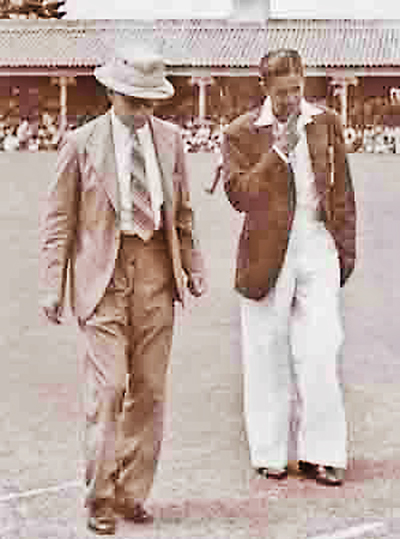‘That was the greatest innings I ever saw or hope to see’ Bradman

For Myna - Ceylon's Sathasivam making the toss with the great Don Bradman, considered the greatest cricketer the world has ever seen
Australian Test batsman and medium pace bowler, Stanley Joseph McCabe (1910 – 1968), was never coached, as were most batsmen of that era – including Don Bradman – and ended his career having played 39 Tests, during 1930 – 1938, with a modest average of 48.21, and 6 centuries.
At the age of 19, he was first selected to tour England in 1930 – the tour that Bradman made his name for the first time – and McCabe was never dropped thereafter from the national team until he retired 8 years later: though an ignominy suffered once by Bradman himself in his second Test. Mind you McCabe had not yet scored a first-class century when first picked for his country -such was the foresight of the Australian selectors.
However three of McCabes’ centuries were epics and are fireside topic of discussions even today when cricket lovers of yesteryear gather together. Admittedly sadly, none of these innings resulted in a victory for Australia.
The first was during the 1932-33 Ashes Test played at Trent Bridge, still known as the infamous Bodyline series with the controversial England captain Douglas Jardine leading England. Due to poor health Bradman was not available for selection. But McCabe in an incandescent innings of 187 not out reached his first Test century, though England emerged victorious. Here are Bradman’s comments on this innings: “Towards the end of his innings he flogged the bowling and with Tim Wall as his partner, dominated a 10th wicket partnership of 55 runs in about half an hour of which Tim made four…….I doubt if any other player has more completely subdued a fiery and resolute attack.” Remember Larwood and Voce were at their “fiery and resolute” best with no restriction on the number of fielders behind the leg-side. Not for the first time did McCabe partner the last man and keep the spectators at the edge of their seats.
The second great innings was played in Johannesburg against South Africa in the 1935-36 series. This took Australia to the brink of an amazing win in this game, before a thunderstorm brought the game to an end.
McCabe’s 189 not out was reportedly one of grace and power, and almost achieved victory for Australia. The stocky right-handed McCabe was using his bat, just as a rapier even in the fading light. The victory target was 399 and Australia was 274 for 2 when in desperation, the fielding side Springbok captain, Herbie Wade, appealed against the light. Yes, for the first and last time in the history of Test cricket a fielding side skipper appealed for light as – Wade had claimed – McCabe’s flashing bat posed a physical danger to his fielders, and the umpires upheld the appeal!
Finally, the third and last of his great innings was against England in the First Test at Nottingham in the 1938 Ashes series. England had scored 658/8 and declared. So an Australian win seemed out of the question especially when the tourists lost 6/194: Cometh the hour cometh the man again. McCabe decided that attack was the best form of defence and plundered 232 runs out of 300 in 235 minutes including 34 fours and a six in a blazing innings of “power without violence and dash without slap.”Bradman himself described this innings in his autobiography as follows: “That was the greatest innings I ever saw or ever hope to see.” This innings was also described in the media succinctly as “the Tornado at Trent Bridge”.
 Continuing, Bradman said: “Towards the end I could scarcely watch the play. My eyes were filled as I drank in the glory of his shots. No less than 44 runs came off Wright in 3 overs and finally with the boundary studded with fieldsmen, he scored 72 in 28 minutes out of the last wicket partnership of 77 runs with Fleetwood-Smith. Such cricket I shall never see nor feel competent adequately to describe the elegant display…….when he returned to the dressing room at the conclusion of this epic performance………I was so moved by the majesty of his innings that I could barely speak…..I gripped his hand, wet with perspiration. He was trembling like a thoroughbred racehorse. I can recall saying to him after expressing my congratulations, “I would give a great deal to be able to play an innings like that. No skipper was ever more sincere in his adulation of another’s skill.”
Continuing, Bradman said: “Towards the end I could scarcely watch the play. My eyes were filled as I drank in the glory of his shots. No less than 44 runs came off Wright in 3 overs and finally with the boundary studded with fieldsmen, he scored 72 in 28 minutes out of the last wicket partnership of 77 runs with Fleetwood-Smith. Such cricket I shall never see nor feel competent adequately to describe the elegant display…….when he returned to the dressing room at the conclusion of this epic performance………I was so moved by the majesty of his innings that I could barely speak…..I gripped his hand, wet with perspiration. He was trembling like a thoroughbred racehorse. I can recall saying to him after expressing my congratulations, “I would give a great deal to be able to play an innings like that. No skipper was ever more sincere in his adulation of another’s skill.”
Indeed Bradman called out members of his team, lolling inside the dressing room, to watch this innings by exhorting, “come and look at this. You will never see the likes of this again.”
Neville Cardus, the doyen of cricket writers added the cream on the cake: “……McCabe demolished the English attack with aristocratic politeness, good taste and reserve….he cut and glanced, drove upright and lissome; his perfection of touch moved the aesthetic sense; this was the cricket of felicity, power and no covetousness, strength and no brutality…….dazzling strokes and rhetoric….lovely grave batsmanship giving joy to the connoisseur, and all done in a losing hour…. one of the greatest innings ever seen anywhere in any period of the game’s history, moving cricket which swelled the heart. He is in the line of Trumper, and no other batsman today but McCabe has inherited Trumper’s sword and cloak.”
Sadly, at the comparatively young age of 58 years, it was reported that he died having fallen from a cliff behind his home. Rumour has it that, suffering from depression, it was a case of suicide.


